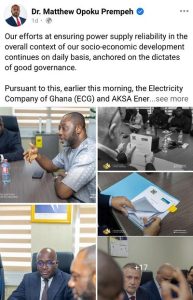
electricity company of ghana (ecg) and aksa energy company limited (aecl) sign power purchase agreement (ppa)
The Electricity Company of Ghana (ECG) is expected to see significant improvements as it signs a power purchase agreement (PPA) with AKSA Energy Company Limited (AECL)
Minister of Energy, Dr. Matthew Opoku Prempeh, Deputy Ministers of Energy, Andrew Egyapa Mercer and Herbert Krapa along with Managing Director of ECG, Samuel Dubik Mahama and executives from AKSA Energy were in attendance of the signing of the Power Purchase Agreement.
Minister of Energy, Dr. Matthew Opoku Prempeh disclosed this in a Facebook post adding that the partnership was imperative for grid stability and reliability, especially in the middle belts of the country.
Our efforts at ensuring power supply reliability in the overall context of our socio-economic development continues on daily basis, anchored on the dictates of good governance.
In my remarks, I reminded the two parties of the essence of this morning’s exercise and thus, charged the ECG to ensure the full operationalization of the agreement in the interest of Ghanaians, the Minister posted.
Dr. Opoku Prempeh reiterated the need for such partnership in the energy sector to facilitate constant availability of power for industrial and residential consumption.
The Ministry of Energy envisages an energy sector that will be robust enough to support our national economy and therefore we will continue on the path of these important partnerships which will result in the constant availability of power for industrial and residential consumption. Dr. Opoku added.
What is Power Purchase Agreement (PPA)?
A Power Purchase Agreement (“PPA”) is generally the primary contract between the public and private sector parties which underpin a power sector PPP. It is typically between a public sector purchaser “offtaker” (often a state-owned electricity utility, in jurisdictions where the power sector is largely state operated) and a privately-owned power producer. It usually provides the primary revenue stream which underwrites the PPP project.
Therefore, the structure and risk allocation regime under the PPA is central to the private sector participant’s ability to raise finance for the project, recover its capital costs and earn a return on equity. This summary is focused on a base load thermal plant developed pursuant to a PPP.
Power Purchase Agreement Pricing
The pricing regime in the PPA typically has two components:
- an availability or capacity charge, which is payable by the offtaker in consideration of the power plant operator making generation capacity available to the offtaker, whether or not it actually offtakes electricity from the power plant. This component is typically designed to provide a revenue floor for the project and is the primary channel through which each project proponent would recover its fixed costs (including its capital investments, financing costs and a return on equity); and
- an output charge – this is usually referenced to the volume of electricity actually delivered and is intended to cover the project company’s variable costs.
When to use a Power Purchase Agreement ?
Power purchase agreements (PPAs) are used for power projects where:
- the projected revenues of the project would otherwise be uncertain and so some guarantee as to quantities purchased and price paid are required to make the project viable;
- there is a possibility of competition from cheaper or subsidized domestic or international competition (e.g., where a neighboring power plant is producing cheaper power) – the PPA provides some certainty of being protected from such competition;
- there is one or a few major customers that will be taking the bulk of the product. For example, a government utility may be purchasing the power generated by a power plant. The government will want to understand how much it will be paying for its power and that it has the first call on that power. The project company will want certainty of revenue; and,
- the purchaser wishes to secure security of supply. (World Bank)
The power distribution company, Electricity Company of Ghana had faced myriad power challenges which have resulted in power rationing and this may have come at the right time where Ghanaians envisage impending power shortages and rationing in coming months and may toss hope at Ghanaians.
CLICK HERE TO JOIN OUR WHATSAPP CHANNEL FOR LATEST UPDATE
CLICK TO SUBSCRIBE TO OUR NEW YOUTUBE CHANNEL
CLICK TO CHECK OUT THE LATEST NEWS IN GHANA
CONTACT (+233) 549-830-824 TO UPLOAD YOUR SONG ON HALMBLOG.COM




Leave a Comment